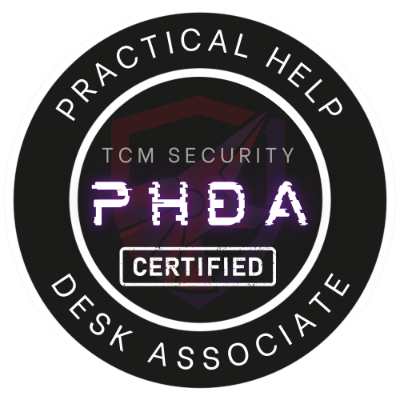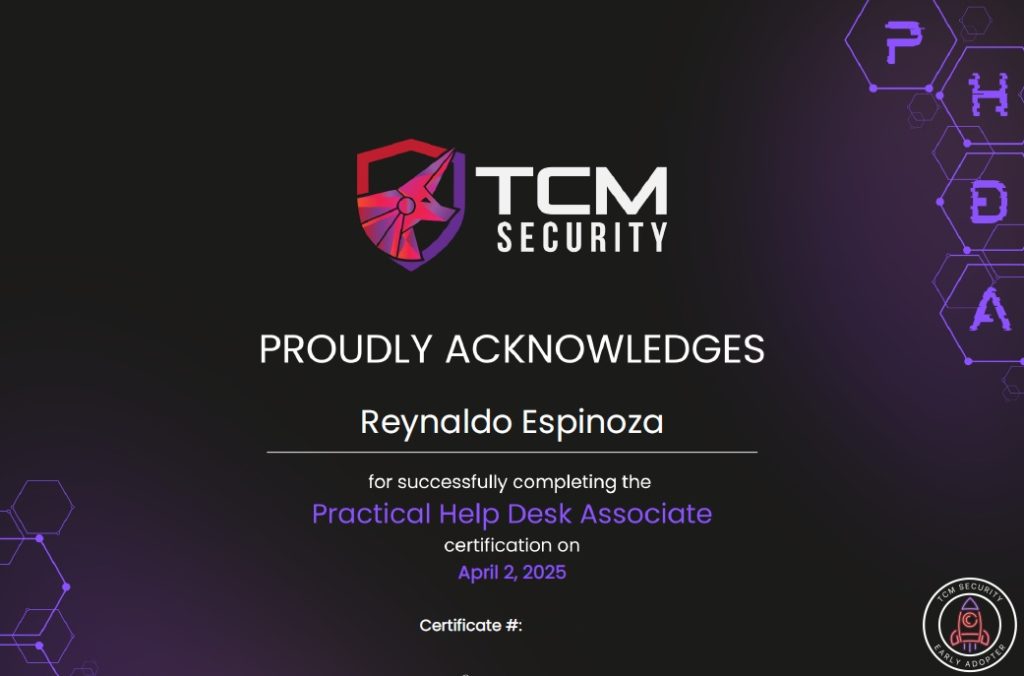Physical Address
304 North Cardinal St.
Dorchester Center, MA 02124
Physical Address
304 North Cardinal St.
Dorchester Center, MA 02124

I may or may not have mentioned this before, but if there were an organizational hierarchy to being “against the grain,” I’d be the CEO. I’ve spent a lot of time going one step forward, two steps back, but fortunately, I’m a resilient (and stubborn) person who refuses to give up.
There have been plenty of setbacks in my IT career. Right now, I’m not even sure I’ll survive this spring ’25 semester. If I fail, I won’t be able to use my VA benefits at my current school come fall. So, as counter-intuitive as it may seem, I decided to take a few days off from school during spring break to focus on something else. Again: against the grain.
I enrolled in the free Practical Help Desk course offered by TCM Security because they had just released the Practical Help Desk Associate certification exam. Even though my original plan wasn’t to start in a help desk role, it’s looking like I may need to scale back on my ambitious goals and consider that as a starting point.
I also needed this cert to rebuild my confidence and keep pushing forward. I’m not sure how else to explain it.
Anyway, I took the exam.
I passed.
Here’s my honest review of the course and the exam.

Let me start by talking about TCM Security and how I came across them. TCM Security is a veteran-owned cybersecurity company focused on providing top-tier penetration testing, security training, and compliance services. The CEO is Heath Adams AKA “The Cyber Mentor” and the entire brand has a real-world, no-fluff energy that instantly stood out to me.
I don’t remember the exact date, but it was sometime in 2021 or 2022 when I came across one of Heath’s videos on OSINT (Open Source Intelligence). That video pulled me straight down the TCM rabbit hole. I started watching more of their [TCM] content and even took a few of their beginner-friendly courses. What stuck with me was how accessible and authentic it all felt. Not just high-level theory, but practical, hands-on knowledge.
The Practical Help Desk course from TCM Security is designed to prepare you for the kind of real-world work you’d do in an entry-level IT support or help desk role. It’s beginner-friendly, but still hands-on enough to make you feel like you’re doing more than just clicking through a slideshow.
The course walks you through foundational IT skills like:
After completing the course, you have the option to take the Practical Help Desk Associate certification exam — and this is where it gets interesting.
One of the things I really respected about the Practical Help Desk Associate exam is how it simulates a real help desk shift. You’re given 8 hours to complete it, which is basically a full workday — and yeah, it feels like one.
When the exam starts, you’re dropped into a ticketing system (called Peppermint) and immediately presented with help desk tickets. No hand-holding. No checklist. Just problems — and it’s your job to solve them.
Some tickets are quick and straightforward (like resetting an AD password), while others require more research and hands-on work (like editing a Linux script or configuring a GPO). There’s even a high-priority ticket mixed in, simulating the need to triage and prioritize — just like in a real IT support role.
Each task you complete has to be documented in the form of a Knowledge Base (KB) article. That’s where you show your work: What was the issue? What steps did you take? What was the resolution? This part of the exam really emphasizes clear communication and documentation — skills that are just as important as the technical side of things.
Overall, the exam isn’t rushed — you have plenty of time if you manage it wisely. But it does keep you on your toes. You feel like you’re actually on a shift, juggling tickets, solving problems, and writing up solutions for the team.
Let me just say this: it felt real. From the moment I logged into the jumpbox and opened the Peppermint ticketing system, I was fully immersed. It wasn’t just “complete this task” — it was “you’re on the clock, solve these problems like you would on the job.”
I started by scanning through all my tickets to see what I was working with. One of them was marked [High Priority] and came from an external source, so that instantly grabbed my attention. That moment set the tone — this wasn’t just a lab, it was a simulation of real-life help desk pressure.
Some of the tickets were familiar ground — like resetting an Active Directory password or creating a new user and assigning them to groups. But others made me slow down, think critically, and double-check my work. For example:
The coolest part? It wasn’t just about solving the technical issue — it was about explaining it clearly. After resolving each ticket, I had to write a KB article describing the issue, the environment, the steps I took, and how I fixed it. That’s when I realized how important documentation is in this field. Trust me, I’m no stranger to documenting steps and procedures. I have 14 years of military experience for that.
There were moments where I got stuck, had to slow down, and troubleshoot like I would in the real world. But I kept moving, ticket by ticket, knocking them out. And when I got to that final task — and confirmed everything was done — I felt legit proud. Not just because I passed, but because I proved to myself that I can do this.
If you’re looking for a certification that actually tests your ability to do the job — not just memorize answers — the Practical Help Desk Associate exam from TCM Security is 100% worth your time.
It’s beginner-friendly but far from watered down. It forces you to think critically, prioritize tasks, follow internal policy, and document your work — everything a real help desk technician has to do. The fact that it’s hands-on and wrapped in a simulated 8-hour shift makes it one of the most realistic entry-level IT certifications I’ve ever come across.
For me, this wasn’t just about checking a box or padding my resume. This exam was a way to get back in the game, to prove to myself that I still have what it takes — even if the path looks different than I originally planned. And I’m glad I took that step.
If you’re a veteran transitioning into IT, a student trying to break in, or someone who just wants to build real skills and confidence — I can’t recommend this course and exam enough.